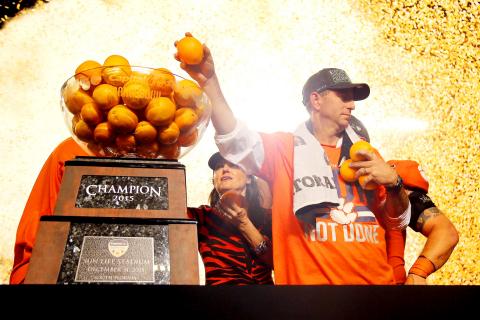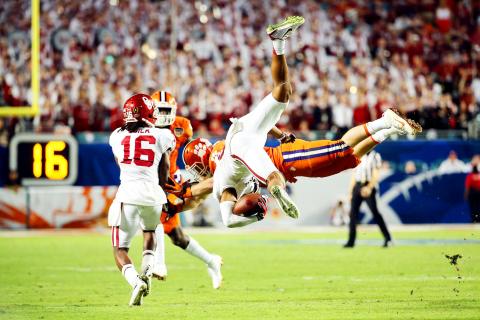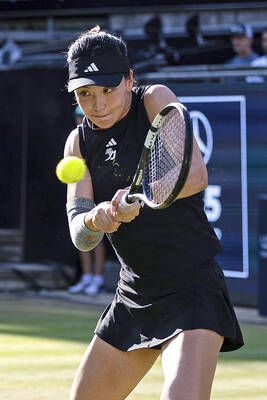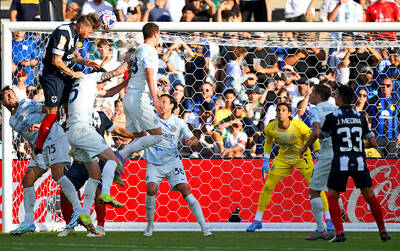At the end of Clemson Tigers coach Dabo Swinney’s news conference on Wednesday, I asked him a theology-based question:
Would there be a place on the Tigers’ roster for a player who told Swinney that he would not be participating in Bible study, church outings, Fellowship of Christian Athletes meetings or any of the other religious activities for which Swinney has become known?
Swinney, whose top-ranked, undefeated team routed Oklahoma in a national semi-final in Miami Gardens on Thursday, said that was easy to answer.

Photo: AFP
“My job is to win football games,” he said. “We’re going to always recruit and play the best football players. We don’t play the best Christians. If we played the best Christians, I wouldn’t be sitting here. I’ve coached a bunch of atheists, I’m sure, along the way — a ton.”
Swinney and Clemson survived what many of us thought would be a rigorous test of faith on Thursday by crushing favored Oklahoma, 37-17, and barreling into the national championship game Jan. 11.
Clemson’s 13-game unbeaten streak this season seemed in jeopardy early in the week when Swinney announced that three players had been suspended from the team and sent home. One of the players was star freshman receiver Deon Cain.

Photo: AFP
It should be eye-opening to Cain that Clemson did not miss a beat without him. Six Clemson receivers caught 17 passes for 218 yards and a touchdown.
My question to Swinney had not come out of a vacuum.
Swinney, who became the Clemson head coach in 2008, wears his faith on his sleeve and has been accused of coercing his team to wear it as part of its spiritual armor.
Last year, the Freedom From Religion Foundation complained about the Clemson football program’s connection to Swinney’s religious conviction.
According to the group, Swinney created a culture in the football program that promoted Christianity and violated constitutional guidelines against publicly funded institutions endorsing religion or engaging in religious exercises.
In a statement responding to the complaint, Swinney said: “Players of any faith or no faith at all are welcome in our program. All we require in the recruitment of any player is that he must be a great player at his position, meet the academic requirements and have good character.”
Good character.
He began his news conference Wednesday by explaining why three members of his Clemson flock had been sent home, reportedly after failing a drug test. Swinney told members of the news media to focus on the 112 Clemson players who were doing the right thing and not the three who had gone astray. I thought about asking Swinney about the parable of the lost sheep, about leaving a flock of 100 sheep to find one that had gone astray. However, there were meetings to attend and a big game to play.
After the lopsided victory over Oklahoma, Swinney repeated the consistent themes of Clemson’s undefeated season: God and the underdog.
“Everybody out there, nobody believed in this team except these guys,” he said.
Why is Clemson’s winning streak so quiet, I wondered, and Swinney said: “We’re just little old Clemson. We’ve won 17 in a row, but we’re still the underdog.”
He added on the three wins that ended the Tigers’ 2014-2015 season.
Why?
“I can’t answer that, and it doesn’t matter,” he said. “We just focus on what we’re doing.”
I am fascinated by the culture of college coaches.
The pro game across the board is superior by far, but no profession better reflects the complexities, contradictions and hypocrisy of contemporary US culture than head coach of a big-time football or basketball program.
The reality is that college coaches — all of them, at every level — are marketers, top-notch recruiters and chameleons.
Their lifeline to survival is a steady flow of talent into their programs. That means persuading impressionable young athletes to ignore a bevy of suitors and cast their lot with them.
Coaches like Swinney, Oklahoma’s Bob Stoops, Alabama’s Nick Saban and Michigan State’s Mark Dantonio are addicted to young talent.
They use every tool at their disposal to get their fix: pointing out the number of players they have sent to the pros; exquisite training facilities; tradition; assurances of academic assistance. Tates Locke, who used to coach the basketball team at Clemson, created a phony black fraternity to assure reluctant black recruits from the North that a rich social life awaited them.
If the issue comes up, a coach will assure parents that religion will be present in their child’s life.
However, these are the accommodations college coaches are obliged to make in the name of giving young people a second chance.
To a much greater extent than their professional counterparts, college coaches make concessions and accommodations to immensely talented 19, 20 and 21-year-olds who help coaches climb the ladder in a highly competitive industry.
On Thursday night, No. 2 Alabama shut out No. 3 Michigan State, 38-0. If the outcome had been reversed and Saban had crashed to a second consecutive semi-final loss, you could have argued that whoever emerged as the national champion this year would have been heir to the Saban throne.
At Clemson, two of the players sent home had been suspended previously this season, one for academic reasons and one after being stopped and charged with possession of cocaine.
Cain had been held out of a game earlier this season for what Swinney called “attitude adjustment.”
For Stoops at Oklahoma, accommodation meant keeping star running back Joe Mixon on the team after he was caught on camera fighting with a female student. Rather than turning the other cheek after being punched, Mixon was shown forcefully striking the woman.
Stoops reiterated that Mixon had been punished, although we both know that if the woman had been Stoops’ daughter, Mixon might not have been on the field in the Orange Bowl on New Year’s Eve.
For all the talk that we have heard and that we will hear from coaches about shaping young lives and making adults out of their players, the realistic head coaches at this level of competition realize that their foremost responsibility is not to save souls.
Swinney said it best when he was asked about recruiting a non-believer.
“My job is to win games,” he said.
At this level, and with these stakes, heaven can wait.

Twelve days after winning her second Grand Slam title at the French Open, Coco Gauff fell at the first hurdle on grass in Berlin on Thursday as beaten Paris finalist Aryna Sabalenka advanced to the quarter-finals. Recipient of a first round bye, American Gauff lost 6-3, 6-3 to Chinese qualifier Wang Xinyu as world number one Sabalenka beat Rebeka Masarova 6-2, 7-6 (8/6) in her second round tie. Winner of 10 main tour titles, including the US Open in 2023 and the WTA Finals last year, Gauff has yet to lift a trophy in a grass-court tournament. “After I won the first

Lionel Messi drew vast crowds and showed flashes of his brilliance when his Inter Miami side were held to a goalless draw by African giants Al-Ahly as the revamped FIFA Club World Cup got off to a festive start on Saturday. Fans showed up en masse for the Group A clash at the Hard Rock Stadium, home to the NFL’s Miami Dolphins, but Messi could not fully deliver, his best chance coming through a last-second attempt that was deflected onto the crossbar. Inter Miami next face FC Porto on Thursday in Atlanta, while Al-Ahly, who benefited from raucous, massive support, are to

Sergio Ramos on Tuesday outfoxed two Inter players and artfully headed home the first goal for Monterrey at the FIFA Club World Cup. The 39-year-old Ramos slipped through the penalty area for the score just as he did for so many years in the shirts of Real Madrid and Spain’s national team, with whom he combined smarts, timing and physicality. Ramos’ clever goal and his overall defensive play at the Rose Bowl were major factors in Monterrey’s impressive 1-1 draw against the UEFA Champions League finalists in the clubs’ first match of the tournament. “There is always a joy to contribute to the

Aaron Civale got a little wild in the right-hander’s first start for the Chicago White Sox two days after he was traded by the Milwaukee Brewers. Civale on Sunday walked four of the first seven hitters he faced in a 2-1 loss to the Texas Rangers. The 30-year-old finished with four walks, one off his career high, while allowing six hits and two runs in five innings. He threw 65 strikes and 39 balls. Chicago trailed 2-1 when he was replaced by Dan Altavilla to start the sixth. “Not the cleanest,” Civale said. “It’s been a whirlwind of a week. First couple